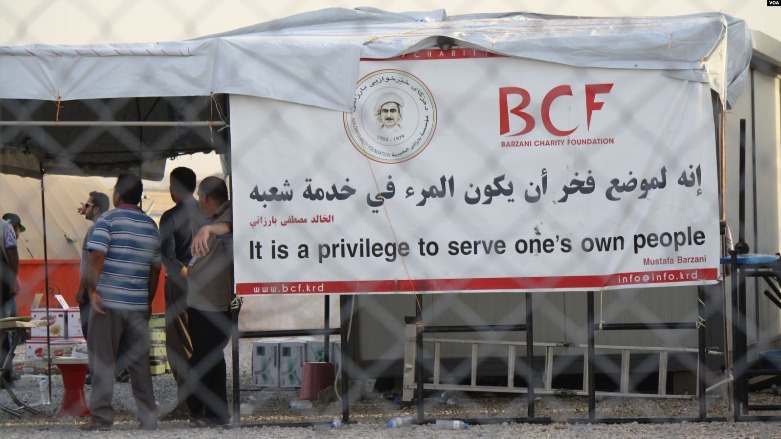Barzani foundation suspends aid in Shingal after PKK-affiliated armed group imprisons office head

ERBIL (Kurdistan 24) – The Barzani Charity Foundation (BCF) announced on Tuesday that it had suspended its humanitarian activities in the disputed and pre-dominantly Yezidi (Ezidi) town of Sinjar (Shingal) because PKK-affiliated armed groups had arrested their office head and also prevent the organization from aiding civilians in the area.
According to a BCF statement, armed groups affiliated to the Kurdistan Workers’ Party (PKK), known as the Shingal Resistance Units (YBS), often attacked their staff members on Shingal Mountain while they were conducting humanitarian operations in the area.
“We have decided to remain silent about the PKK armed group and continued to serve the people of Shingal with more aid as well as delivering the voice of Shingal to the world through different international conferences,” the statement read.
“Unfortunately, the PKK fighters continue their inhumane behavior,” it continued. “On April 28, they arrested and jailed the head of our office in Shingal at a time when the BCF and the American organization of Nebraska Church staff were distributing humanitarian aid to the people of Shingal.”
BCF is one of the more active organizations among local and international charity groups, providing humanitarian assistance to hundreds of thousands of Internally Displaced Persons (IDPs) in the Kurdistan Region for over a decade.
The organization was founded in 2005 and has made it an objective to honor the legacy of Malla Mustafa Barzani, the leader of the Kurdish Liberation Movement and a prominent figure in the founding of the contemporary Kurdish nation.
The BCF strongly condemned the arrest and imprisonment of their office head in Shingal and said they could no longer operate and provide humanitarian aid to the people of Shingal as a result.
It warned that the lives of their volunteers and staff would “be at serious risk should they continue to work in the area” because of the “violent behavior” the PKK-affiliated fighters in Shingal demonstrate against civilians and local and international humanitarian organizations.
The Kurdish organization also extended its call to the Federal Government of Iraq, the United Nations, the US-led coalition, and other humanitarian organizations to prevent the armed groups in Shingal from turning the area into their base and fuel political tensions.
“Civilians in Shingal need more help, better living conditions, and the building of infrastructure in their areas,” the BCF stressed.
Kurdistan 24 tried to contact YBS commanders in Shingal to clarify the situation, but they refused to comment.
The emergence of the Islamic State and its violent assault on Shingal in 2014 led to the displacement of hundreds of thousands of Ezidis. Most of them fled to the Kurdistan Region, while others resettled in neighboring countries in the region or Western states.
Others were not as lucky and remained stranded in the war zone, where they experienced atrocities and mass executions at the hands of the extremist group for years. Militants subjected women and girls to sexual slavery, kidnapped children, forced religious conversions, executed scores of men, and abused, sold, and trafficked females across areas they controlled in Iraq and Syria.
Before the 2014 attack, there were roughly 550,000 Ezidis in the Kurdistan Region and Iraq. As the militants took over large swaths of territory in Nineveh province, 360,000 Ezidis escaped and found refuge elsewhere, according to the Kurdistan Regional Government’s (KRG) Ezidi Rescue Office.
The BCF was the first humanitarian organization to deliver aid to dozens of thousands of Ezidis trapped on Shingal Mountain.
So far, over 69 mass graves which contain the remains of Ezidis have been excavated along with untold numbers of individual graves.
Kurdish and Ezidi Peshmerga forces, with the support of the US-led coalition, liberated Shingal from the Islamic State in November 2015. However, the town remains virtually vacant with little to no basic services available.
Shingal, an area disputed between Erbil and Baghdad, is currently under the control of Iraqi forces and Shia-dominated militias. These forces, plus a limited number of Peshmerga and other Kurdish fighters, are present in Shingal and its outskirts with reports of tensions between them over who will control the strategic town that lies near the Syrian border.
Although Shingal was fully liberated from the Islamic State by late 2017, hundreds of thousands of Ezidis remain displaced in the Kurdistan Region due to insecurity and a lack of basic services in their largely-destroyed hometown.
Editing by Karzan Sulaivany
